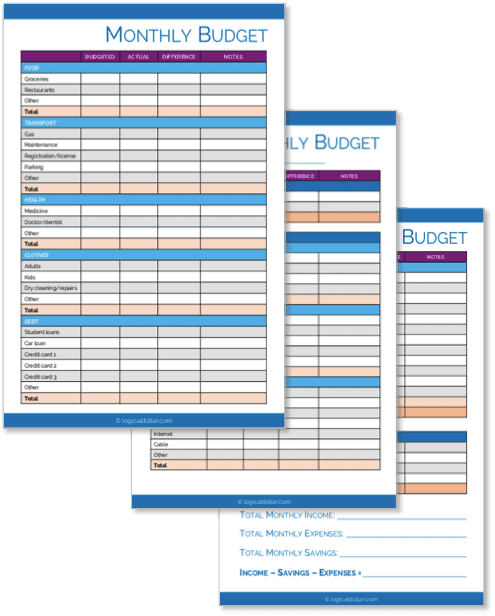Whether you’re planning for retirement, are just really sick of the usual nine to five or are struggling to land your next position, the question of how to live without a job is something almost all of us have to consider at one point.
After all, that’s the ultimate aim of any sort of financial plan: to one day be able to survive without working consistently. That’s basically the goal of any follower of the FIRE movement – or Financial Independence, Retire Early – where learning how to be financially independent without a job is your main focus.
But what about if you’ve been forced into not working, such as if you’ve been laid off?
Whether you’re aiming for FIRE or aiming for any job at all, the question of how to thrive without a job is just as critical.

TAKE BACK CONTROL OF YOUR FINANCES
Our free budget planner will help you to quickly and easily take control of your money – instead of it controlling you.
Get it free for a limited time!
You’ll also join our mailing list to get updates on how to manage your money – unsubscribe at any time at the end of each email.
Fortunately, it’s more than possible to live without working. With some good money management and putting in the effort to have your finances all in order, you’ll see just how you can survive without a job, including how to survive on no income until you find your next one.
And with a bit of time and extra commitment, you’ll even see how to set yourself up to be financially independent without a job.
How to live without a job
Unless you wake up one day with a massive inheritance or win the lottery, you’re almost certainly not going to be able to simply resign out of the blue at some point.
This also means that being fired without warning can be one of the scariest things to happen to anyone.
Either way, the answer to the question of how to live without a job requires careful planning, by getting all your financial ducks in a row.
However, this raises the question: what if you don’t have the time to do this, because you’ve lost your job and need money desperately now? Whichever side of things you fall under, following these steps will absolutely help.
You may also be interested in: Why Your Left Hand Itching May Mean Lottery Luck
1. Calculate your total expenses
The first step is to figure out an approximate amount of how much you’re going to need each month in order to survive without a job.
It’s usually easiest to base this off the amount of your current expenses, although you may need to make some adjustments.
For example, if you’ve recently lost your job, you may be able to remove some work-related expenses from this calculation as well as some “extras” that you already know you’re going to cut back on.

Similarly, if this is part of a retirement planning process, you may be paying for education costs for your kids at the moment, but probably won’t be spending money on this by the time you retire. Or you could be paying off a mortgage right now but plan to pay this off in full before you finish working. On that basis, it’s safe to say that your life after your mortgage is paid off will involve your annual living expenses dropping significantly.
Other expenses to consider include in your retirement planning:
- Health care, including health insurance. If this is currently tied to your job, you’ll need to estimate how much this could cost you once you’re no longer working
- Travel costs, depending on how much of the world you want to see when you retire
- The costs of other activities that you plan to do once you’re no longer filling your time by working
How much money do you need to never work again?
The general rule if you don’t want to work again is that your savings/investment target should be at least 25 times your annual expenses. This is based on the 4% rule, which is used to calculate how much you should withdraw from your investments each year in order for the money to last for your entire retirement.
Basically, however much your portfolio is worth at the start of your retirement, data has shown that withdrawing up to 4% of that amount every year will ensure that you don’t run out of money.
This means that the amount you think you’ll spend each year will determine how much money you need if you don’t want to work again.
For example, say that you think you’ll need $40,000 every year to cover your expenses. Multiplied by 25, this means that you need to have $1,000,000 in your retirement account to keep you going.
But if you drop this to $30,000? Suddenly you only need $750,000 to be able to safely live without a job, meaning you could resign years earlier.
As you can probably see, this means that controlling your spending is going to have a major influence on when you’ll be able to stop working.
2. Determine how you can reduce your spending
It’s pretty clear that the amount you spend each month is going to have a massive impact on whether you can survive financially while not working. This means the next step in figuring out how to live without a job is determining how you can cut back on your spending.
The best way for anyone to do this is to start a budget. Then, you’ll be able to see exactly where your money is going and figure out where you can begin to make cuts to increase your savings rate.
A good area to focus on at first is cutting your expenses in the areas where you find yourself spending the most money. For most people, this includes
- Living costs – Can you move somewhere smaller and/or cheaper to reduce your mortgage or rental expenses – or even move somewhere more affordable?
- Food costs – Using a cash back app like Ibotta for your groceries is a must for anyone (and the free $20 sign-up bonus is pretty good too!). But there are other ways to save money on food – for example, if you eat out or get takeout a few times a week, can you cut this back to once a month? Taking your food to work instead of buying it is also a common tip, but it’s because it works.
- Transport – Downsizing your car or even selling it altogether can save you a ton of money. Also look into taking public transport to work to save on parking, gas and maintenance costs.
It can also be a good idea to create a personal financial plan to set some financial goals and work out exactly how you can use the coming years to achieve them.
Ibotta
Free sign-up bonus: $20
Ibotta’s a completely free app that gives you cash back on what you’re buying already – groceries, medicine, clothes and more.
In fact, users make $150 per year on average – not including your free $20 welcome bonus – with over $682 million having been paid out, so you know Ibotta is definitely legit.
3. Pay off your debt
Your approach at this point is going to depend on whether you’ve lost your job and are looking for a new one or whether you’re planning to never work again.
If you’ve lost your job and are looking for a new one
If you’re trying to survive without a job until you’re able to secure a new one, paying off debt beyond your minimum payments may not be feasible right now.
And this is one situation where it’s fine to not focus on getting out of debt. Instead, your absolute focus has to be on cutting your expenses.
Keep making your debt repayments at the same time, but paying off debt beyond the minimum payments won’t be your goal now – simply making it to the next pay check has to take priority.

(Of course, if you can afford it, feel free to keep chipping away at destroying your debt! These debt snowball worksheets may help.)
And if you’re struggling to make your minimum repayments from your existing savings, even after having done everything you can to reduce your spending (including putting a major focus on this like through a 30 day challenge), a good strategy can be to look into other ways you can earn money.
Whether it’s doing the occasional odd job or working online from home freelancing, any sort of income flow is going to make things much easier.

MANAGE YOUR MONEY LIKE A BOSS
Managing your money effectively can literally change your life. And starting a budget using our budget planner is the first step towards you doing just that.
Get it free for a limited time!
You’ll also join our mailing list to get updates on how to manage your money – unsubscribe at any time at the end of each email.
If you’re planning for retirement
Let’s be upfront about this: You’re never going to be able to survive without working indefinitely if you don’t pay off all your debt first.
You could argue that low-interest debt, like a mortgage, is fine to carry after you stop working. But even if the repayments are manageable, they still need to be made, and these will simply eat into your savings or investment withdrawals.
Instead, a far better strategy is to make sure you’re debt-free before quitting your job.
(Or, if needed, that your debts are fully covered from other sources, such as if you have a mortgage on an investment property that’s paid for with your tenants’ rent payments.)

The best way to do this is to:
- List all your debts in order from highest interest rate to lowest
- Pay them off in that order
Some people recommend you pay them off in order from smallest to largest amount of debt. And while that can be good for giving you some quick wins, it’s going to cost you much more money overall in interest.
So as we’re all adults here, try to aim to pay off the debt with the largest interest rate first.
That said, in the end, both strategies have the aim of getting you debt-free, meaning successfully following either of them is FAR better than nothing.
4. Establish an emergency fund
An emergency fund basically serves as a financial parachute if you have a situation where:
- You suddenly have to pay for something that’s either completely unexpected or much higher than expected, like if your roof is blown off in a storm and it’s not covered by insurance; or
- Your income is suddenly cut and you’re not able to cover your normal expenses, like if you lose your job.
So if you’re considering stopping work to live off your savings and investments, you can probably see why having an emergency fund is critical given your lack of income.
It’s best to keep this money in a high interest savings account – preferably one that’s fee-free, so you’re earning as much money on your savings as you can.
FYI: For most people, the general recommendation is to save up three to six months of expenses three to six months of expenses
But if you’re looking into how to live without a job, it’s a good idea to increase this to twelve months of expenses. Without any steady income, it’s going to be much harder to cover any “surprise” expenses so you’ll want to make sure that you’re well placed in case something like that happens.
This will also help if the stock market dives and your investments suddenly lose a lot of value for a period of time. In those cases, you’re meant to also reduce the amount you’re withdrawing until the market recovers, meaning the savings in your emergency fund could be used to cover the difference in your expenses.
5. Create other income sources
Having other income sources is going to be critical for anyone who wants to stop working, particularly passive income. After all, it’s only with passive income that you’ll be able to continue to earn money to live off.
One of your biggest passive income sources is going to be any investments you hold, including your retirement accounts. As they (ideally) continue to grow in value and pay you dividends, you’ll be withdrawing from an ever-increasing amount that will ensure you don’t run out.
However, there are a number of other passive income sources that you could rely on. And with some creativity, hard work and a bit of luck, these could definitely be built up so that you can make a living without a job. In particular, the goal here is for them to continue to generate income for you, even when you’re not actively working on them.
You may also check this article about: Is $10,000 a Lot of Money? (+ 11 Tips on What to Do With It)
How can I survive with no income?
If you have no income at all coming in, then you’re going to have to live off your savings to survive with no income. While this can work for some time, especially if you cut your expenses to let your savings last as long as possible, it’s important to try to have some of your money invested.
That is, having no income at all implies that you also have no income from investments, like dividends. Not only will you probably struggle to save up enough to cover your annual expenses forever, there’s also the problem that this probably isn’t feasible given that the interest rate in your savings account probably isn’t that good.

But if you’re asking the question of how to live without money coming in from a traditional job-like arrangement where you perform services or provide goods and then get money for this, then you’ve got a whole new world of income to discover!
That is, sources of passive income – or earning income without actively working to do so – are what most people need to develop to see how to live without a job.
This could include:
- Shares, which can grow in value and pay dividends
- Property, where you may receive income through tenants paying rent
- Licensing fees, if a company is paying you to use your idea to make money
- Royalties, like what an author receives each time one of their books is sold
Or even earning money from managing a website that people continue to visit, even when you’re not working on it directly!
All of these things (and many more) can see you survive with no income from a job. It’s worth keeping in mind though that they’ll all probably require some work while you do still have a job, so that you can build them up to a point where they are generating real income for you passively.
How do I get rich without working?
Most people who get rich without working do so through carefully investing their money either in traditional assets, like stocks and property, or in businesses, including their own. Over time, these investments increase in value and can eventually produce a steady stream of passive income, allowing someone to have a high net worth without working.
That is, you’re probably not going to get rich overnight, so it does take some time to get to the point where you can make a living without working.
For example, there are absolutely website owners earning six- or seven-figure incomes from their blogs each year. But they didn’t wake up one day and suddenly own highly successful sites. It took years of building their online business to get to that stage.
And that’s the point: while passive income sources can generate huge amounts of income for you, to the extent that you can get seriously rich without working, it will take some work beforehand.
Which means getting started now while you’re planning how to live without a job is a great step in the right direction.
6. Stick to a budget
By this point, you should have started making some really positive financial moves to prepare yourself for retirement – whenever you plan for that to be.
However, this could be years, or even decades, away and sticking to your current money mindset may be difficult for all that time.
Pro tip: The biggest problem most people encounter when saving and investing for retirement (or anything, really) is not controlling their spending.
With a bit of lifestyle creep and not watching your money closely enough, your financial plans can quickly be derailed.
This is why keeping a close eye on your spending is one of the most important things you can do when working towards a financial goal, like being able to retire.

And one of the best ways to do this is to start and stick to a budget. That way, you’ll know exactly where all your money is coming in and out and can then make adjustments accordingly.
It’s almost guaranteed that you’re spending more on some things than you realize. Maybe those weekend dinners are really adding up or you didn’t quite notice how much that new hobby was actually costing you.
Whichever it is, starting a budget will help you identify these financial black spots and let you work to fix them.
7. Look for ways to supplement your passive income (if needed)
Quitting your job to retire, no matter your age, doesn’t mean you have to stop working altogether. In fact, Forbes reported that 36% of retirees are working part-time or have reduced their working hours.
And earning even a small amount of money on the side can go a long way to making sure you can afford to survive without a job.
Let’s say for example you’ve calculated that you’ll need to withdraw $40,000 per year from your retirement account to cover your expenses, which is equivalent to around $770 per week.

But if you know that you can actually continue to earn $200 per week from freelancing or your side hustle, you’ve suddenly reduced the amount you need from your investments to only $570 per week or less than $30,000 per year ($29,640 to be exact).
Using the rule of 25, this means that you’ll only need to have $741,000 saved in order to retire, compared to the $1,000,000 needed if you plan to rely on $40,000 per year from your investments.
How to make money without a job
There are plenty of ways to make money without a job, with some of the best ones set out below:
- Join paid focus groups: Focus groups involve you answering questions about things like new products or political issues. And they can be incredibly lucrative, with sites like Survey Junkie offering up to $150 an hour just for you answering these questions.
- Share your device information: Nielsen offers perhaps the easiest way for you to make money. That is, just for installing their app on your computer or phone, they’ll pay you $50. Don’t worry, it’s completely anonymous and the information is unable to be traced back to you, as what they’re interested in is how the wider public use their devices.
- Play games: You’re probably spending time playing games anyway, so why not make some extra dollars at the same time? Swagbucks is a great app for this, with a huge variety of games – plus their free $5 welcome bonus is pretty good too!
- Do surveys: You won’t become a millionaire from doing surveys, but it can be a super simple way to make some extra cash just by spending a couple of minutes answering some questions on your phone. Check out InboxDollars, which has a great range of surveys on offer.
- Freelance: No matter your area of expertise, there’s bound to be freelancing opportunities for you. And the best part is that it doesn’t count as having a job! Upwork is a great site to see what kind of clients you can potentially work with.
Can I live off a part time job?
You can live off a part time job if your earnings are high enough to meet your expenses. This means you may need to reduce your costs to avoid spending beyond on your means. You should also factor in the costs involved in contributing to your financial goals, like preparing for retirement.
This means that it’s going to depend on where you are (in terms of minimum wage) and how often you work, but it’s definitely possible to live off a part time job.

That said, if you’re looking into how to live without a job, a part time job doesn’t quite fit the bill. After all, the distinction between having a job – whether it’s part time or full time – or doing freelance tasks on the side is the commitment involved.
Do you absolutely have to come in for a few hours each week? That’s a job.
Or are you doing something that, when it’s done, you don’t have to do anything else on it unless you choose to? Then that’s definitely more on the freelance side of things – and is likely much better suited to someone looking to make money without actually having a job.
8. Set yourself some goals or life purposes
This is the final stage of working towards living without a job. In fact, once you make it to this point, you may have already quit. And it’s true that the idea of not having to get up for work every day is definitely a good one.
No alarm clock ever again, no annoying boss who takes credit for your work. Just you and whatever it is you want to do with your time.
But the key part there is finding something to do with that time. No one wants to spend their retirement sitting on the couch in front of a TV.

After all, you’ve probably worked crazy hard to get to the financial point where you’re able to live without a job. So now it’s on you to make the best use of the time you’ve just bought yourself.
It’s worth mentioning that this shouldn’t be interpreted as if when you do have a job, work should be your life. In fact, having purposes outside of work is more than healthy – and if you can transfer these purposes to your post-work life, then that’s great!
But there’s a reason that this study found that the likelihood that someone will suffer from clinical depression actually goes up by about 40% after retiring.
So it’s important to find ways to avoid this by making sure you stay occupied physically, mentally and socially.
What can I do without a job?
If you’re about to retire, the options for what you can do without a job are basically anything that your time, money and health allows. If, however, you’re between jobs, you can use this time to develop your professional expertise and to focus on your employment search, including fine tuning your CV and practicing your interview skills.
For those who have reached retirement, the list of things to do is almost endless. Some people travel. Others volunteer or, as mentioned above, do some freelancing work. Many start to get in shape, take up a hobby they haven’t had time to do before or catch up on that long-delayed reading list.

And a lot do a combination of all of the above – and more!
People do report though that having a schedule is key to making sure that you’re actually using your new non-working time effectively and that you don’t get stuck in a rut.
You probably already have some idea on how you wish to spend your time once you no longer have a job and that’s a great start. Just make sure that you keep things as balanced and healthy as possible.
How to thrive without a job
Learning to thrive without a job without a job is important for both your mental and physical health. This means that you should work on finding a purpose or focus outside of your work – something which is also true even when you still have a traditional job.
That is, whether you love your job or hate every minute of it, your job shouldn’t be your sole purpose in life – although there’s nothing wrong with thriving in it.
Making sure you have enough money to last throughout your retirement is a major part of this. You don’t want to have to go back to regular work in the years to come if you run out and you also want to make sure you can afford your post-work dreams.

(Well, within reason.)
But, as just mentioned, finding a (potentially new) purpose in life is also critical for making sure you’re able to thrive.
If you’re not sure where to start, there are plenty of ideas online for how to spend your retirement. Narrow this down to some ideas that appeal to you and start to plan for how exactly you could achieve these, including in terms of scheduling.
And before you know it, you’ll have started to build your new post-work routine.
Related: 13 Must-See Money Documentaries on Netflix (to Get Smart on Finance)
Is it possible to live without a job?
It’s more than possible to live without a job, as shown by anyone who’s ever had a comfortable retirement. This also includes those who’ve taken a pause from working before the traditional retirement age. Ultimately, it comes down to having enough savings and other sources of income to cover your expenses even when you’re no longer getting a salary.
Whenever you plan to survive without a job, in the end it comes down to good money management in the years beforehand. That is, by spending less than you earn and investing the rest, you’ll be well on your way to securing your financial future. In particular, it can really help to have some consistent sources of passive income, so you can continue to make a living without a job.
And this is even the case if you’ve been let go from your job, meaning that living without a job wasn’t your choice. It’s still possible in this situation to thrive without a job, although it’s also why having an emergency fund is critical for getting you through this period. That way, you’ll have some finances to see you through until you get your next pay check.
How do people live without working full time?
From a purely financial perspective, plenty of people live without working full time. They do this either by reducing their expenses and working part time or saving and investing enough to live on what they already have – or, in many cases, a combination of both. This means that it will take some careful money management to get to this point.
Fortunately, the steps outlined in this article show you exactly what it takes to do this.
And on the question of how do people live their lives if they’re not working full time, you may wish to scroll up a bit for a discussion on this exact question.
How to be financially independent without a job
Being financially independent without a job is something that many people aspire to. It even has a name: the FIRE movement – or Financial Independence, Retire Early. The most common way to do this is to invest as much of your income as possible from an early age and reduce your expenses, to ultimately live off your investments.
The FIRE movement refers to those people looking to retire long before typical retirement age, with many of them being in their 40s or even in their 30s when they achieve this.
And it’s more than possible to do, simply by following the steps outlined in this article.
Sure, you may need to be a bit more extreme in your money-saving habits by being as frugal as possible and increasing your income when you can. But these people show that it’s definitely a reasonable goal to aim to be financially independent without a job.
How can I be happy without a job?
Being happy without a job comes down to finding a purpose or focus in life outside of your work. It’s easy to become defined by your job, meaning you can feel lost without it. This is why it’s important to identify other areas of your life that can bring you satisfaction, such as volunteering, a hobby or a side hustle.
After all, have you ever heard of the saying “You should work to live, not live to work”?
There’s definitely merit to this. At the same time, there’s nothing wrong with loving and being happy with your job. In fact, that’s what most of us should aspire to!

But if you’re worried that you’re going to be unhappy without a job, then it’s more important than ever that you find yourself a new purpose in life.
What most people love about their job is either how they feel when they achieve at it or the impact that their work has on others.
This means that it’s worthwhile examining yourself and figuring out which of these categories you fall under. Once you’ve done that, it will make it easier for you to figure out how to continue to be happy once you’ve left work.
What can I do instead of working?
The list of things to do instead of working is basically unlimited. But some of the most common ideas include:
- Traveling
- Starting a new sport (or getting better at one you’ve enjoyed for a while)
- Taking up a hobby
- Starting a side hustle
- Volunteering
- Writing a book
Final thoughts on how to live without a job
Taking the right steps to make sure you’re able to live without a job is something many of us spend our entire lives doing – and others don’t spend any time at all.
Unfortunately, not everyone prepares for retirement properly. At the same time, some people are so good at it that they’re able to quit their jobs decades ahead of schedule!
Whichever one you’re aiming for, the steps in this article are exactly what you need to follow in order to set up your financial future and survive without working.
In fact, financial freedom should be the aim for everyone. And with some commitment to your money-related goals and discipline with your saving and spending, you’ll find that being able to afford to live without a job is more than feasible.

READY FOR MORE?
Join thousands of subscribers in getting regular tips in your inbox on how to take control of your finances and save more money – and, for a limited time, get our free budget planner as a gift!
You’ll also join our mailing list to get updates on how to manage your money – unsubscribe at any time at the end of each email.






